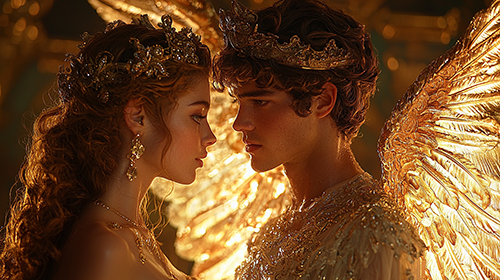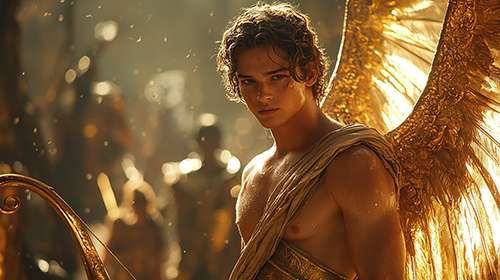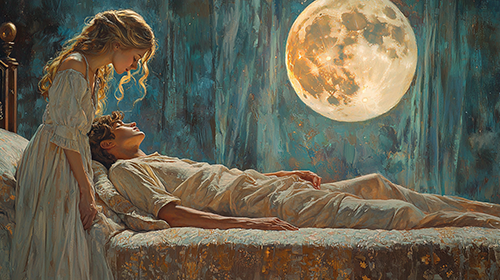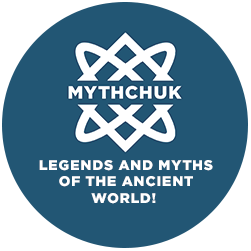The Myth of Cupid and Psyche: A Tale of Beauty, Trials, and Divine Love
- Main
- >
- Roman Mythology
- >
- Roman Myths and Legends
- >
- The Myth of Cupid and Psyche
This is a story in which beauty becomes a curse and love a trial that changes everything…
The Myth of Cupid and Psyche
The myth of Cupid and Psyche originates in the 2nd century AD, preserved in The Metamorphoses (also known as The Golden Ass) by the Roman author Apuleius. It is the only surviving ancient version of their tale. The myth tells of the love between a god and a mortal woman, who must undergo a series of incredible trials in order to earn immortality.
 The Myth of Cupid and Psyche
The Myth of Cupid and PsychePsyche — The Mortal Who Outshone a Goddess
Once, in a faraway land, there lived a young woman named Psyche. Her beauty was so unparalleled that people came from every corner just to see her. Statues of Venus stood flowerless, and her altars smoked empty—people worshipped a mere human girl instead of the goddess. This enraged Venus. Jealousy consumed her heart. She summoned her son, Cupid, the god of love, and commanded:
“Make this girl fall in love with the most miserable man alive.”
And so the intrigue began…
 Psyche
PsycheThe Arrow That Missed Its Mark
Cupid arrived at Psyche’s home, but upon seeing her, he accidentally wounded himself with his own arrow—and fell deeply in love. The one who mastered the hearts of others was himself conquered.
Meanwhile, Psyche suffered: despite her beauty, she had no suitor. Her elder sisters had all married, while she remained alone. Her father sought the oracle of Apollo, who declared that Psyche was destined not to wed a mortal man but a “fearsome winged beast.” Fulfilling the prophecy, her father abandoned her on a mountaintop.
 Cupid
CupidA Secret Husband in the Palace of Winds
As Psyche stood alone atop the cliff, the wind god Zephyr swept her away to a sublime palace. There she found herself surrounded by luxury and the unseen voices of servants. Her husband visited her only at night and strictly forbade her to discover his true identity.
Psyche lived in bliss, but doubt soon crept in. One night, she invited her sisters to visit. Witnessing her splendor, they burned with envy and convinced her that her husband must be a monster to be slain before it was too late. Thus began her true ordeal…
 A Secret Husband in the Palace of Winds
A Secret Husband in the Palace of WindsThe Lamp That Revealed the Truth
One night, while Cupid slept, Psyche took a lamp and a dagger—planning to see him and, if necessary, kill the beast. When the lamp’s light fell upon him, she saw not a monster but a handsome winged youth—Cupid himself.
Awestruck, she leaned in to kiss him—but a drop of hot oil from the lamp fell upon his shoulder, waking him. Feeling betrayed, he fled, and the palace vanished. Thus began the most arduous part of her journey.
 The Lamp That Revealed the Truth
The Lamp That Revealed the TruthVenus’s Four Impossible Tasks
Psyche set out in search of Cupid and eventually reached Venus’s palace. The goddess, still seething with resentment, set Psyche four seemingly impossible tasks:
Sort grains—wheat, barley, millet, and lentils—by morning. Ants helped her complete the task.
Collect golden wool from fierce sheep. A reed whispered advice: gather wool from branches at dusk, when the sheep are resting.
Fetch water from a high cliff’s waterfall guarded by dragons. An eagle, sent by Jupiter, snatched the water for her.
Journey to the underworld and bring back a box containing a “bit of beauty” from Proserpine. She completed the ritual, but curiosity overcame her; she opened the box—and fell into a deep sleep.
 Venus
VenusA Divine Resolution
Cupid, who still loved Psyche, could not bear her plight. He fled from his mother and flew to Psyche, reviving her from her enchanted slumber. He then went to Jupiter and pleaded for permission to marry his beloved mortal.
Jupiter, moved by the power of their love, consented. He granted Psyche ambrosia—the food of the gods—making her immortal. At last, Cupid and Psyche were united. Their love was blessed further with the birth of their daughter, Voluptas (Pleasure).
 Cupid and Psyche
Cupid and PsycheThis is one of the few ancient myths in which gods grant a mortal forgiveness, love, and even immortality. Apuleius illustrates this tale not merely as a love story but as an allegory of the human soul (ψυχή, “psyche” in Greek)—in search of the divine, with all its fears, doubts, and hopes.
The myth has been invoked in philosophical treatises, Renaissance and Baroque artworks, and even psychology—as a symbol of profound personal transformation through love and trials.
